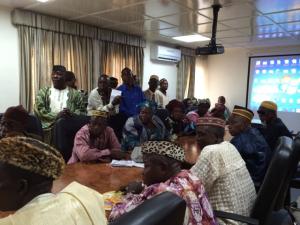Ebola: Traditional chiefs sent messages to their communities in Liberia
Members of the National Traditional Council of Liberia addressed their communities in the 16 counties of the country. They urged people to take all possible measures to protect themselves from, and encouraged them to welcome the health workers helping in the response.
The traditional chiefs of the 16 tribes have recorded several radio messages in different languages telling their people to take steps to avoid Ebola. Those messages are being shared through community radio stations all over the country. The traditional leaders also committed to travel to their counties, especially to remote towns to further spread the word about how to prevent Ebola.
In a meeting with Liberian authorities and representatives of the World Health Organization (WHO), the traditional leaders discussed the messages to be shared with the communities, as well as the questions that would have to answer.
Denial and resistance from the communities is one of the major challenges in the on going outbreak in Liberia. Many people do not believe that the virus exists, or are reluctant to acknowledge that their relatives or friends or themselves are sick. Some even run away.
The engagement of the community is key not only to prevent the spread of the virus, but also to control it. It is vital to be able to properly trace those who have been in contact with people with Ebola, as well as to treat them if they get sick. Local leaders play an important role in sharing the message with communities, and WHO has been working with them to strength this interpersonal communication in Liberia.
“We need you, we extremely need you to stop this deadly virus”, said WHO Representative in Liberia, Dr. Nestor Ndayimirije, He called on the traditional chiefs to tell their people to welcome health workers who come to help, not to touch those who are sick, keep the contacts of those who are sick in the communities so they can be monitored, and to call for help to bury their relatives.
“I’m African and I respect the traditions. Together we can work to do it in a safe way.”
A video with testimonies from people who have survived Ebola was presented to the Traditional Council to emphasize that although Ebola is a highly and deadly infectious disease, if seeking help early can save lives.
Rallying the other chiefs in the room with a loud cry, the Chairman of the Council Zanzan Karwor, asked them to spread the word. “My people, I call you: talk to your people, talk to your children.”
The chief said that many people in their communities still didn’t believe that Ebola was real so the video could be a tool to show them people who had the disease and survive. “Because you need something to believe is true.”
“I appeal to all of you. We have to move from county to county to talk about this,” he told the other members. “You are tradition, you are soul. I appeal to you to bring the message to your community.”
Several chiefs shared questions they had received in their community, requesting answers: “What is in the spray that medical teams use with dead bodies?” “Is it true that they take away your kidney?” “How do you know when you have Ebola?” What medicine are you given?”
“We are here to engage you”, said the minister of Internal Affairs, Morris Dukuly, to the members of the Traditional Council. “You are the owners of the land. Ebola is real, but it doesn't have to kill you. If you hide, you don´t survive”.
In Liberia, the WHO country office has been supporting the Ministry of Health in many areas, such as coordination, community outreach, contact tracing and surveillance, case management and treatment, as well as providing supplies and protective gear for health workers.
_____________________
For more information, please contact:
Maricel Seeger, Communications / Media
WHO Liberia
Tel: 0880 048 865 / +231 880 048 865
Email: %C2%A0seegerm [at] arg.ops-oms.org (seegerm[at]arg[dot]ops-oms[dot]org)



